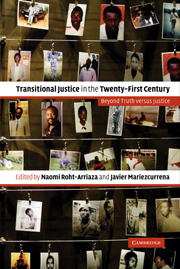Book contents
- Frontmatter
- Contents
- List of contributors
- Acknowledgments
- The new landscape of transitional justice
- Part I Truth, justice, and multiple institutions
- Part II Levels of justice: Local, national and international
- Introduction to Part II
- 7 A new approach to restorative justice – East Timor's Community Reconciliation Processes
- 8 Justice at the grassroots? Gacaca trials in Rwanda
- 9 Bremer's “Gordian Knot”: Transitional justice and the US occupation of Iraq
- 10 Truth, justice and stability in Afghanistan
- 11 The prosecution of Hissène Habré: International accountability, national impunity
- 12 Argentina's contribution to global trends in transitional justice
- 13 Transitional justice: Lessons learned and the road ahead
- Index
10 - Truth, justice and stability in Afghanistan
Published online by Cambridge University Press: 05 June 2012
- Frontmatter
- Contents
- List of contributors
- Acknowledgments
- The new landscape of transitional justice
- Part I Truth, justice, and multiple institutions
- Part II Levels of justice: Local, national and international
- Introduction to Part II
- 7 A new approach to restorative justice – East Timor's Community Reconciliation Processes
- 8 Justice at the grassroots? Gacaca trials in Rwanda
- 9 Bremer's “Gordian Knot”: Transitional justice and the US occupation of Iraq
- 10 Truth, justice and stability in Afghanistan
- 11 The prosecution of Hissène Habré: International accountability, national impunity
- 12 Argentina's contribution to global trends in transitional justice
- 13 Transitional justice: Lessons learned and the road ahead
- Index
Summary
Afghanistan differs in important respects from other countries currently struggling with the problem of addressing past abuses. Afghanistan's transition from the repressive Taliban regime was not brought about by a popularly backed revolution, nor by a negotiated power-sharing accord among all parties to the conflict. Since the fall of the Taliban regime in November 2001, there has been no formal national or international agreement on any truth, reconciliation or judicial process to deal with the past – nor that there should be any such process at all. In fact, there has not as yet been any formal peace agreement, and the country is not yet at peace. Continuing conflict throughout broad swathes of the country's southern provinces, as well as in pockets in the north, imperils basic reconstruction efforts and has left civilians vulnerable to continuing abuses – in many cases by the same armed factions responsible for past war crimes.
Afghanistan's demographic indicators also present challenges to political actors who want to pursue a process leading to accountability for past violations. As of mid-2005, Afghanistan had experienced twenty-seven years of conflict, beginning with a bloody revolution, and followed by foreign occupation, civil war and back to international conflict. The endless war has devastated a country that was already at the margins in terms of every indicator of human development.
- Type
- Chapter
- Information
- Transitional Justice in the Twenty-First CenturyBeyond Truth versus Justice, pp. 255 - 277Publisher: Cambridge University PressPrint publication year: 2006
- 3
- Cited by

